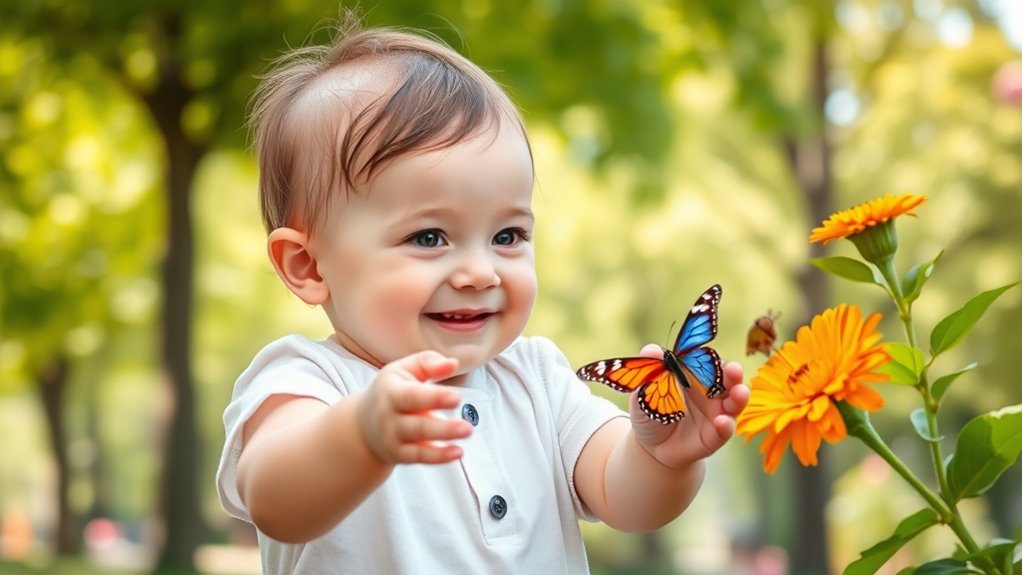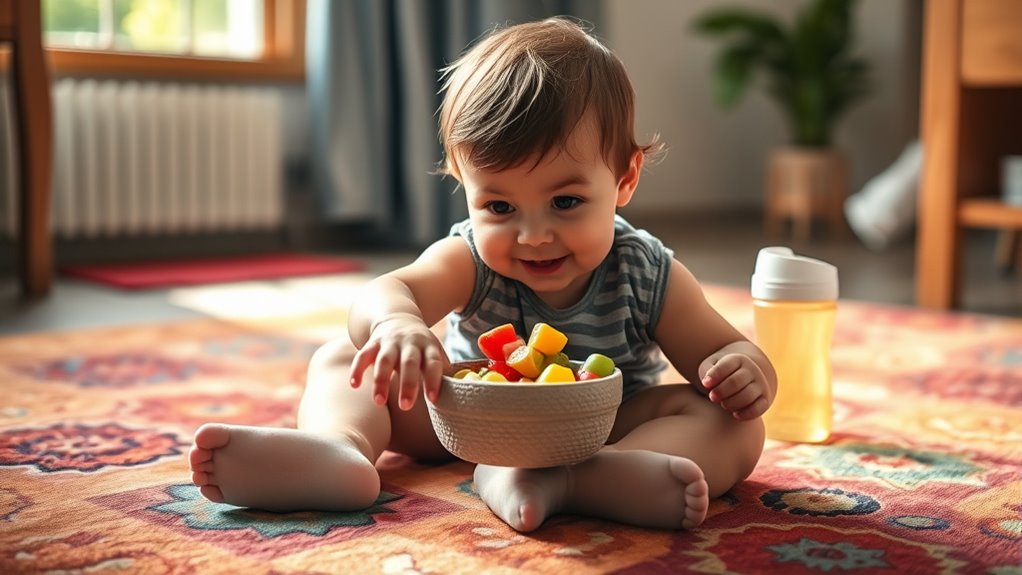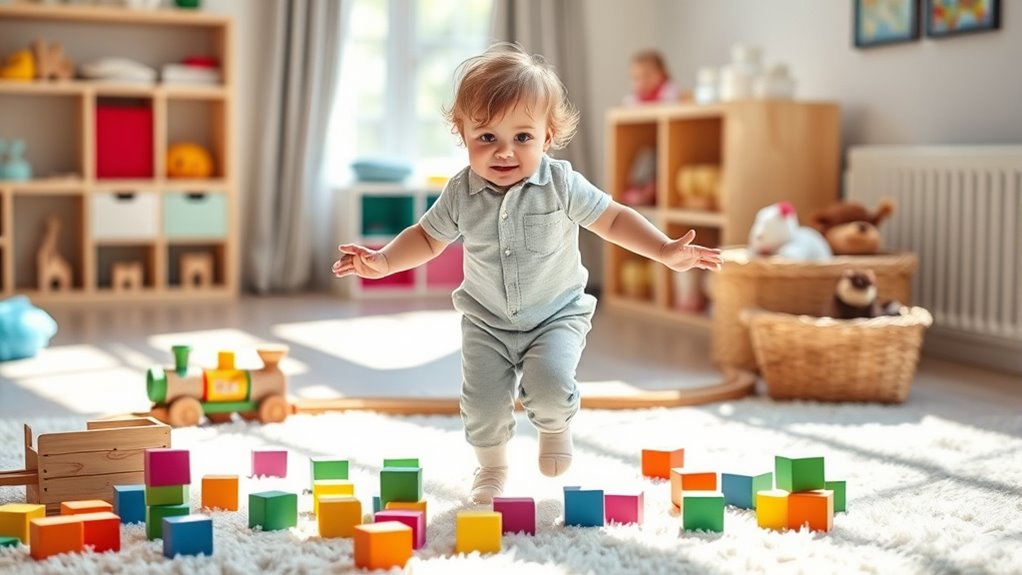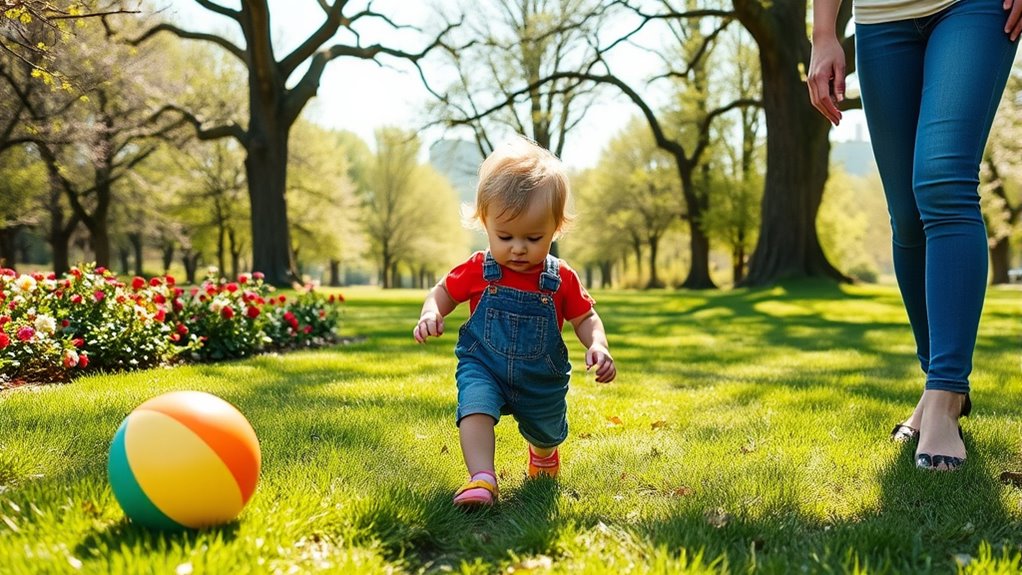Between 18 and 24 months, your toddler will master walking confidently, climb furniture, and develop fine motor skills like stacking blocks. They’ll start talking more, use gestures, and express feelings clearly. Socially, they seek independence and explore boundaries. Their curiosity sparks problem-solving, and routines help them sleep better and eat healthily. With plenty of safe exploration and encouragement, they grow confident and capable. Keep exploring to discover more ways to support your child’s exciting growth during this stage.
Key Takeaways
- Toddlers master walking confidently, climbing furniture, and running, showcasing rapid gross motor development.
- They develop fine motor skills like stacking blocks, turning pages, and grasping small objects.
- Vocabulary expands to simple phrases, with increased gestures and signs for communication.
- Curiosity drives exploration, problem-solving, and understanding cause-effect relationships through play.
- They begin asserting independence with self-help skills, making choices, and expressing emotions clearly.

Cumbor 29.7-46" Baby Gate for Stairs, Toddler Safety Essentials for The House, Auto Close Dog Gate for Doorways, Mom's Choice Awards Winner-Easy Install Pressure Mounted Pet Gates for Dogs, White
Proud Recipient of the Mom's Choice Award: Cumbor draw on decades of customer experience that's why parents and…
As an affiliate, we earn on qualifying purchases.
As an affiliate, we earn on qualifying purchases.
Physical Development and Motor Skills

During the 18–24 month period, your toddler experiences rapid growth in physical development and motor skills. You’ll notice they become more coordinated, mastering both gross and fine motor skills. Gross motor skills improve as they start walking steadily, climb furniture, and even run with confidence. Their balance and coordination are developing quickly, allowing them to navigate their environment more independently. Meanwhile, fine motor skills become more refined—your child may begin to stack blocks, turn pages in a book, or grasp small objects with thumb and forefinger. These milestones reflect their increasing muscle strength and hand-eye coordination. Supporting this growth involves providing safe spaces for movement and encouraging activities that challenge their budding skills. Additionally, exploring motor skill development through play can help enhance their physical confidence and coordination. Engaging in regular physical activity and play-based learning can further boost their muscle strength and coordination, setting a foundation for future skills. Promoting physical confidence is essential as they continue to explore and practice new movements daily.

Melissa & Doug Wooden Building Blocks, 100-Piece Set of Sorting & Stacking Toys in 4 Colors and 9 Shapes, Classic Toddler Toys for Girls & Boys Ages 2+ – FSC Certified
Build, Stack & Imagine: Kids explore endless possibilities by stacking, balancing, and knocking down colorful wood blocks while…
As an affiliate, we earn on qualifying purchases.
As an affiliate, we earn on qualifying purchases.
Language and Communication Growth

At this stage, your toddler’s vocabulary is rapidly expanding, and they may start combining words to form simple phrases. You’ll notice more gestures and signs as they find new ways to communicate their needs and feelings. Additionally, their listening skills improve, helping them understand more of what you say and respond accordingly. As they develop, they may also begin to imitate sounds and words they hear, laying the foundation for language development. Early language milestones can offer insights into early language milestones and support tailored learning approaches. Recognizing speech development signs can help caregivers provide appropriate encouragement and support during this critical period.
Vocabulary Expansion Milestones
Have you noticed how your toddler’s vocabulary starts to grow rapidly around this age? They begin making exciting connections through word associations, linking words to their experiences. You might see your child naming objects like ‘ball’ or ‘dog’ clearly and confidently. This stage marks a big leap in language development as they expand their vocabulary daily. Your toddler might also start combining two words, such as ‘more juice’ or ‘big truck,’ showing their understanding of language structure. These milestones reflect their growing ability to communicate needs and ideas. Encouraging them with simple conversations and naming objects during play helps reinforce these new words. Keep in mind, each child develops at their own pace, but this surge in vocabulary is a key step toward more complex language skills. As they continue to develop, their increasing vocabulary of electric bikes can inspire new interests and activities.
Gesture and Sign Usage
As your toddler’s language skills grow, they often begin to use gestures and signs to communicate before they can express all their needs with words. This is when baby sign language and gesture imitation become valuable tools. Your child may start waving goodbye, pointing to objects, or using simple signs to express themselves. These gestures help bridge the communication gap and reduce frustration. You might notice them copying your gestures or using signs they’ve learned. Incorporating consistent practice and positive reinforcement can enhance their learning experience. Engaging in indoor activities that promote gesture use can further support their cognitive development and confidence in expressing needs.
Developing Listening Skills
How can you support your toddler’s developing listening skills during this stage? By engaging in daily conversations, reading aloud, and naming objects around them, you help improve their listening comprehension. Repeating sounds and words encourages sound recognition, which is essential at this age. Use activities that stimulate their curiosity and attention span. Incorporating vetted products like age-appropriate books and toys can further enhance their learning experiences.

My First Learn-to-Talk Book: Created by an Early Speech Expert!
Book for helping little ones learn how to talk
As an affiliate, we earn on qualifying purchases.
As an affiliate, we earn on qualifying purchases.
Social and Emotional Skills

At this age, your child starts to develop independence skills, wanting to do more on their own. They also begin expressing their emotions more clearly, making it easier to understand how they feel. These milestones help lay the foundation for healthy social and emotional growth. Additionally, recognizing digital literacy is increasingly important as children become more familiar with technology and communication methods. Understanding fetal development during pregnancy can also help parents appreciate the physical and emotional changes happening in their bodies and the growing baby.
Developing Independence Skills
Have you noticed your toddler starting to assert themselves more? This is a great sign of developing independence skills. At this stage, they’re enthusiastic to try new things, explore, and do tasks on their own. You can encourage this by providing opportunities for independent play, which boosts confidence and decision-making. They’re also beginning to develop essential self-help skills, like feeding themselves, dressing, and brushing teeth. Supporting these efforts fosters a sense of autonomy and competence.
Some ways to nurture independence include:
- Letting them choose their clothes or toys
- Encouraging them to complete simple chores
- Providing safe spaces for exploration
- Praising efforts to do things independently
This helps your toddler build a strong foundation for emotional resilience and self-reliance.
Expressing Emotions Clearly
You may notice your toddler starting to express their feelings more openly, which is a key milestone in developing social and emotional skills. They might use words or gestures to share emotions like happiness, frustration, or sadness, helping you understand what they’re experiencing. While this emotional expression is a positive step, it can also lead to tantrums when emotions become overwhelming. During these moments, your role is to help with tantrum management by staying calm and offering comfort. Encourage your toddler to use words or simple signs to communicate feelings, which promotes healthy emotional development. Recognizing emotional cues can further enhance your child’s ability to express themselves clearly and understand others better. By acknowledging their emotions and guiding them through their reactions, you’re helping your child learn to manage feelings effectively and build strong social and emotional skills.

Wooden Montessori Baby Toddler Toys: 3 in 1 Learning Fine Motor Skills Juguetes, Educational Color Sorting Fidget Sensory Toys for Toddlers Boys Girls Gifts Object Permanence Cause and Effect
🌟 𝐓𝐇𝐑𝐄𝐄 𝐋𝐈𝐃𝐒, 𝐋𝐈𝐌𝐈𝐓𝐋𝐄𝐒𝐒 𝐋𝐄𝐀𝐑𝐍𝐈𝐍𝐆 This complete Montessori-style color sorting toy includes a geometric lid, a round coin-style…
As an affiliate, we earn on qualifying purchases.
As an affiliate, we earn on qualifying purchases.
Cognitive Development and Problem-Solving

How do toddlers this age demonstrate growing cognitive skills and problem-solving abilities? You’ll notice they’re exploring their environment with curiosity development, enthusiastic to understand how things work. Their problem-solving skills improve as they experiment and try new things. They might figure out how to open doors, stack blocks, or find hidden objects. This age is all about testing limits and learning from trial and error. Your toddler may also start asking questions or pointing at objects to learn more. These behaviors show their rapid cognitive growth and ability to process information. To support this, provide safe opportunities for exploration and encourage their questions. Activities that challenge their thinking help enhance their problem-solving skills and satisfy their curiosity. Additionally, observing how they adapt to new situations provides insight into their developing cognitive abilities. Incorporating mindful learning techniques can further foster their developmental progress.
Sleeping Patterns and Routines

At this age, toddlers typically establish more consistent sleeping patterns and routines, which help promote restful sleep and overall development. A predictable bedtime routine, like reading a story or singing a lullaby, signals to your toddler that it’s time to wind down. Maintaining regular nap schedules also supports their growing need for rest and helps prevent overtiredness. Consistency is key; sticking to the same bedtime and nap times each day creates a sense of security and helps regulate their internal clock. As your toddler becomes more active during the day, ensuring they get enough quality sleep at night and during naps becomes essential. Incorporating sleep routines and scheduled rest periods guide your little one toward better sleep habits, fostering healthy growth and mood stability. Incorporating calming sound therapy into bedtime routines can further enhance their ability to relax and fall asleep more easily. Additionally, understanding sleep patterns can help caregivers identify signs of sleep disturbances and adjust routines accordingly.
Nutritional Needs and Eating Habits

During this stage, toddlers’ nutritional needs become more specific as they grow and become more active. Establishing consistent feeding routines helps guarantee they get essential nutrients for development and energy. You’ll notice their snack preferences evolving; they may prefer finger foods or specific flavors. To support healthy eating habits, consider offering a variety of foods from all food groups. Keep mealtimes relaxed and positive to encourage good habits. Pay attention to portion sizes, avoiding force-feeding or pressure. Also, limit sugary snacks and drinks, promoting healthier choices. Remember, toddlers are exploring their independence through eating, so patience is key. By maintaining regular routines and understanding their snack preferences, you help foster balanced nutrition and a positive relationship with food.
Play and Exploration Activities

As toddlers become more confident with their eating habits, they also keenly explore their surroundings through play. This stage encourages creative play, where they mimic everyday activities and invent new scenarios, boosting their imagination. Sensory activities become especially important, helping them learn through touch, sight, smell, and sound. You might provide them with textured toys, water tables, or play dough to stimulate their senses and curiosity. These activities support their fine and gross motor skills, while also fostering problem-solving and independence. Remember, safe, supervised exploration is key. Incorporating age-appropriate toys can further enhance their sensory development and engagement. By offering diverse and engaging opportunities for play and sensory experiences, you help your toddler develop essential skills and a love for discovering the world around them.
Tips for Supporting Your Toddler’s Growth

Wondering how you can best support your toddler’s growth at this stage? Focus on consistent behavior management and safety precautions to create a nurturing environment. Set clear, simple boundaries to help your child understand expectations, reinforcing positive behavior. Offer opportunities for independence, like choosing between two outfits or snacks, to boost confidence. Keep safety precautions in mind by childproofing your home and supervising closely during play. Encourage exploration while maintaining a structured routine, which helps your toddler feel secure. Remember, patience and gentle guidance are key as your child navigates new skills and behaviors. By staying consistent and attentive, you’ll foster your toddler’s emotional, physical, and cognitive development effectively.
Frequently Asked Questions
When Should I Be Concerned About My Toddler’s Development Delays?
If you’re concerned about your toddler’s development, trust your instincts and watch for signs like speech delays or motor skill concerns beyond typical age ranges. You should see a professional if your child isn’t babbling, using simple words, or struggling with walking or coordination by 24 months. Early intervention can make a big difference, so don’t hesitate to seek guidance from a pediatrician if you notice anything worrying.
How Can I Encourage My Toddler’s Independence Safely?
To encourage your toddler’s independence safely, start with simple steps like supervising self-care skills and encouraging independent play. Set up a secure space where they can explore freely, fostering confidence. Use clear, consistent cues and praise their efforts to boost motivation. Keep a watchful eye while allowing them to try new tasks, helping them build bravery and independence while ensuring their safety every step of the way.
What Are Signs of Separation Anxiety in Toddlers?
You might notice signs of separation anxiety in your toddler through clinging behaviors, like holding on tightly when you try to leave, and bedtime resistance, such as crying or refusing to sleep alone. They may become more anxious when you’re out of sight or when routines change. These behaviors are normal and usually temporary. Offering comfort, maintaining routines, and gradually encouraging independence can help ease their anxiety.
How Do I Handle Temper Tantrums Effectively?
Handling temper tantrums is like diffusing a storm—you need calmness and patience. You should use calming strategies, such as speaking softly and offering comfort, to help your toddler settle down. Setting boundaries clearly and consistently shows what’s acceptable. When tantrums occur, stay calm, acknowledge their feelings, and gently guide them back to manageable behavior. This approach helps your child learn self-control and feel secure.
When Should I Introduce New Foods to My Toddler’s Diet?
You should introduce new foods to your toddler’s diet gradually, around 6 months, but continue to focus on toddler nutrition as they grow. Offer small portions of different foods, watching for allergies or reactions. Keep introducing a variety of flavors and textures to expand their palate. Be patient and consistent, making mealtimes enjoyable. This approach helps your toddler develop healthy eating habits and guarantees balanced nutrition.
Conclusion
By now, your toddler’s growth is like a wild rollercoaster zooming through every milestone imaginable—running faster than a cheetah, talking in storms of words, and exploring the world like a tiny explorer with endless energy. Every day, they’re transforming before your eyes into a little superhero with superpowers of curiosity, laughter, and discovery. Embrace these incredible moments, because before you know it, they’ll be soaring into even bigger adventures, leaving you breathless with pride!









